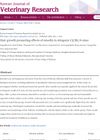 2 citations,
June 2016 in “Korean journal of veterinary research”
2 citations,
June 2016 in “Korean journal of veterinary research” Emodin may help hair grow similarly to minoxidil and could treat baldness.
 2 citations,
July 2013 in “Veterinary dermatology”
2 citations,
July 2013 in “Veterinary dermatology” Dog skin with hair loss, when transplanted to mice, regrew hair, suggesting the hair loss cause is likely body-wide, not skin-specific.
[object Object] 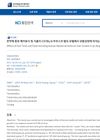 2 citations,
January 2011 in “The Korea Journal of Herbology”
2 citations,
January 2011 in “The Korea Journal of Herbology” Korean medicinal herbs in hair tonic and food increased hair growth in mice.
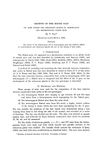 2 citations,
January 1960 in “Australian Journal of Biological Sciences”
2 citations,
January 1960 in “Australian Journal of Biological Sciences” The Naked gene in mice causes abnormal sebaceous glands and disrupts hair follicle organization.
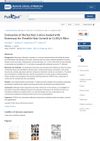 1 citations,
March 2023 in “PubMed”
1 citations,
March 2023 in “PubMed” Rosemary hair lotion significantly promotes hair growth and could be a potential alternative to commercial hair growth products.
 1 citations,
October 2022 in “Annals of Translational Medicine”
1 citations,
October 2022 in “Annals of Translational Medicine” Cucurbitacin helps mice grow hair by blocking a protein that stops hair growth.
 1 citations,
April 2020 in “Clinical, Cosmetic and Investigational Dermatology”
1 citations,
April 2020 in “Clinical, Cosmetic and Investigational Dermatology” Acyclovir cream may slow down hair growth, suggesting it could be a new treatment for excessive hairiness.
 1 citations,
March 2020 in “Functional foods in health and disease/Journal of functional foods in health & disease”
1 citations,
March 2020 in “Functional foods in health and disease/Journal of functional foods in health & disease” OM-X® helped prevent negative effects of Vitamin C deficiency in mice, suggesting it could protect organs and regulate metabolism.
[object Object] 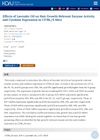 1 citations,
March 2016 in “Journal of Investigative Cosmetology”
1 citations,
March 2016 in “Journal of Investigative Cosmetology” Lavender oil promotes hair growth in mice.
1 citations,
January 2015 The gel with apigenin and celery juice promotes hair growth without causing skin irritation.
1 citations,
December 2010 in “Daehan miyong hakoeji” Polygoni mulitiflori Radix water extracts promote hair growth and are safer than minoxidil.
November 2024 in “Biochemical and Biophysical Research Communications” Abnormal gene expression related to keratin causes hair loss in certain mice.
Whale oil significantly promotes hair growth and may be a safe, effective alternative to minoxidil.
 April 2024 in “bioRxiv (Cold Spring Harbor Laboratory)”
April 2024 in “bioRxiv (Cold Spring Harbor Laboratory)” Removing Sprouty genes in mice causes various hormone-related issues but does not increase cancer risk by one year of age.

Whale oil may safely and effectively promote hair growth.
 April 2024 in “Cellular signalling”
April 2024 in “Cellular signalling” Activating TRPMLs helps human cells important for hair growth and increases hair growth in mice.
 March 2024 in “Medical lasers”
March 2024 in “Medical lasers” Multiple-wavelength radiation helps hair grow by boosting early hair follicle development.
 March 2024 in “Cell communication and signaling”
March 2024 in “Cell communication and signaling” Lack of sleep in mice leads to prostatitis by reducing certain hormones and activating an inflammatory pathway, which can be temporarily fixed with normal sleep.
 March 2024 in “International Journal of Pharmaceutics”
March 2024 in “International Journal of Pharmaceutics” Ginsenoside Rg3 combined with minoxidil was more effective in treating hair loss in mice.
 January 2024 in “GeroScience”
January 2024 in “GeroScience” Using radiation to make mice's hair turn gray helps study and find ways to prevent or reverse hair graying.
 January 2024 in “Современные проблемы науки и образования (Modern Problems of Science and Education)”
January 2024 in “Современные проблемы науки и образования (Modern Problems of Science and Education)” Miliacin helps extend the hair growth phase in mice with hair loss.

Essential oils in a nanoemulsion help hair grow better than minoxidil 2% in mice.
Transplanted rat hair follicles grew hair and had increased but not fully restored nerve connections in mice.
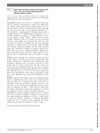 October 2023 in “Regular and Young Investigator Award Abstracts”
October 2023 in “Regular and Young Investigator Award Abstracts” Baricitinib treatment helped reduce hair loss symptoms in mice by decreasing inflammation-related immune cells.
 October 2023 in “FASEB bioAdvances”
October 2023 in “FASEB bioAdvances” Akkermansia muciniphila may help prevent testosterone-related hair loss.
December 2022 in “Biochemical and Biophysical Research Communications” HtrA2 activity is crucial for normal hair growth by regulating fat cell development.
 January 2022 in “Food Science and Technology”
January 2022 in “Food Science and Technology” The herbal mixture could potentially improve hair loss.
 January 2022 in “Pharmaceutical Sciences Asia”
January 2022 in “Pharmaceutical Sciences Asia” The extract from Clitoria ternatea flowers helps human skin cells grow and promotes hair growth in mice.
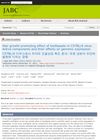 December 2021 in “Journal of Applied Biological Chemistry”
December 2021 in “Journal of Applied Biological Chemistry” Toothpaste containing α-tocopherol acetate, l-menthol, and stevioside can promote hair growth in mice.
 December 2020 in “bioRxiv (Cold Spring Harbor Laboratory)”
December 2020 in “bioRxiv (Cold Spring Harbor Laboratory)” Stress can cause a type of hair loss in mice lacking the CCHCR1 gene.
























